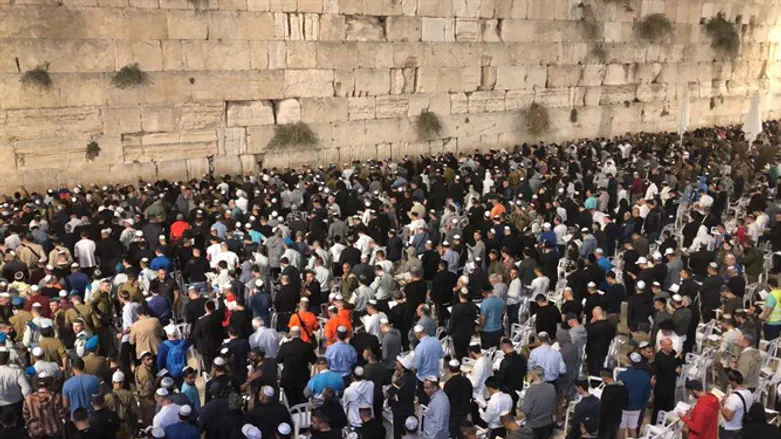
The Fast of Gedalia, which falls on the day after Rosh Hashanah, is one of the four fast days established by the propphets and Torah Sages to memorialize the destruction of the Hoy Temple and Jewish nationhood in the Holy Land.
Each stage of the Temple's destruction is marked by a fast day.
On the tenth of the Jewish month of Tevet, the king of Babylon began the siege of Jerusalem, On the 17th of the month of Tammuz, the city walls were breached, on the ninth of Av (586 B.C.E.)the Temple went up in flames, and on the first of Tishrei the governor of the remnant of Jews allowed to live in the land, Gedalia, was murdered, making the destruction complete.
After the Babylonian king destroyed the city of Jerusalem and its Holy Temple, a small remnant of Jews remained in the Land of Israel, in Judea, and the king appointed Gedalia son of Ahikam to govern them. Jews who had fled to neighboring lands began to return. It was a small Jewish center that managed to survive in the Holy Land, but on the first of Tishrei, Yishmael son of Netanya, rose up against Gedalia and murdered him.The king then ordered the dispersal of all Jews in the country, bringing an end to Jewish life in the Holy Land.
Our Sages (Tractate Rosh Hashanah 18) decreed that the third of Tishrei be a fast day in remembrance of Gedalia's murder, just as the day of the Temple's destruction was declared a fast day. "To teach you that the death of a tzaddik, a rightous man, is equivalent to the burning of the House of our G-d." And of course, the death of this tzaddik who served as the pillar of strength for the remnants of Jewry in Judea and the fact that it was Jews who plotted to kill him, destroying the last vestiges of Jewish life in the land, deepens the mourning. This happened, poignantly, during the Ten Days of Repentance,
The Prophet Zachariah prophesied that one day in future times, these days would be turned into days of happiness and rejoicing: "So saith the Lord of Hosts, the fast of the fourth [month of the Jewish year], the fast of the fifth and the fast of the seventh and tenth will be days of happiness and joy and celebration for the House of Judah, and may you love peace and truth." (Zachariah, chap. 8)
There are days inbued with unique powers. If we merit it, they can be transformed into holidays, but if, G-d forbid, we do not, they become days of woe. The ten days between Rosh Hashanah and Yom Kippur are days of that nature, and can be days of tikkun, of improvement, if we will them to be. If we do not merit that, the way it was then, the day becomes the ultimate day of destruction. But the opportunity for tikkun exists, and the day of the fast itself - and the Days of Repentance - harbor a unique possibility of becoming days of renewal, building and adding life and holiness to the world.
May it be G-d's Will that this year be one of salvation and redemption, in which the light of faith and Torah shines on all of Israel.
Translated from Hebrew by Rochel Sylvetsky